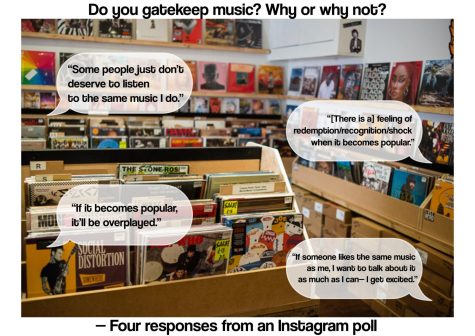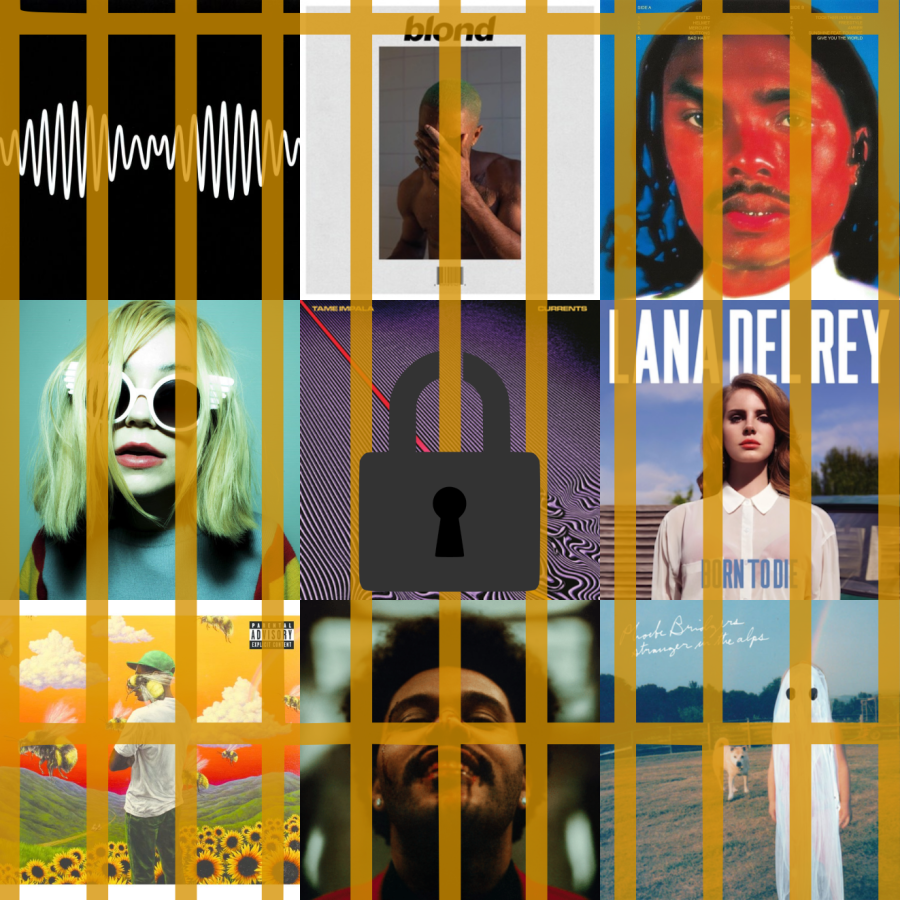The art of gatekeeping: A deep dive into musical sanctity
Many devoted fans of Lana Del Rey, Steve Lacy, the Arctic Monkeys and others have been known to gatekeep songs from others who’ve discovered them because of viral content on TikTok, rather than coming across their music in a more traditional word-of-mouth manner. These fans fear new listeners won’t have a profound understanding of the art beyond internet sensation.
January 4, 2023
Gatekeeping music: a defense mechanism for deeply personal connections from waves of unprecedented cult popularity. Online, it has its own snark and almost snobbish attitude—plenty of memes share the sentiment of gatekeeping certain niche artists, and a visit to official audio content on YouTube will often include listeners frowning upon those who’ve discovered the song only through social media platforms like TikTok. Though many find it unassuming, it’s more than just a pretentious internet shtick.
People are quick to dismiss gatekeeping as a habit of theirs, since its connotations are often condescending, pretentious and denote an offputting superiority complex. However, understanding why some do isn’t a difficult task. People take pride in their music tastes and spend quite some time deciding on their favorite artists, albums and performances, and why.
Music could be considered the closest thing humans have to time machines. As an imperative method of understanding, dispelling and expressing one’s emotions—especially during difficult or overwhelming times—it’s a societal staple that every generation, future and past, has had access to and relied on. It lends listeners a chosen ambiance, a sonic refuge for cumbersome emotions and a beautiful connection between an individual and a larger culture or community. Thus, hesitancy and utter avoidance is common when deciding to recommend lesser-known music because of their deeply personal meanings from specific pinpoints of life.
Everything starts to change for devoted fans when music goes viral—song lyrics and overall meanings can become disambiguated, losing the secretive spark they once had. As this cycle, whether a revival or death, continues with the trends of modern culture, fans and listeners face these questions: how much can we merit gatekeeping despite its usually negative implications? What can it tell us about our relationship with music as a representation of our identities? How does it influence the music industry and the success of artists and musicians?
TikTok fans – Is it gatekeeping or safekeeping?
Embarking on his Gemini Rights tour in 2022 for his album of the same name, many people are familiar with R&B artist Steve Lacy and his infamous “TikTok fans” flocking to his shows. One of the most notorious clips from the tour shows him performing “Bad Habit,” arguably his most internet-famous song, while fans only sung the lyrics popularized by the app and immediately went quiet afterwards, not knowing the rest of the verse.
Agonized commenters were quick to disapprove. “I’m usually against gatekeeping, but maybe we should’ve kept Steve Lacy away from the mainstream, bro doesn’t deserve this,” one wrote.
Further clips from the tour show objects being pelted towards Lacy from the crowd, and him responding with growing frustration at the audience during the following shows.
Certainly, this isn’t characteristic of a great audience. Coordinating outfits with friends, taking pictures at the venue and proceeding to sing one’s heart out along with just a few (or countless) others to fan-favorite songs are what both musicians and fans alike hope for. Not to mention the price of coveted tickets (for Lacy’s tour, somewhere between $96-$140 each), all for five seconds of enthusiastic crowd sing-along? More than anything, both musicians and fans seek a mutual connection with each other through the music; the lack of which, where the music is only popular but not beloved enough to be resonated with, dulls the experience.
The flipside of TikTok – Internet ingenuity
For an artist like Tai Verdes, however, the contrasting side of TikTok prevails. Playing basketball, trying stand-up comedy, acting and performing song covers on Instagram and YouTube were endeavors he juggled, until he posted himself playing music one day on TikTok and saw himself take off, from working at Verizon to going on a U.S. tour in a few short months.
In an interview he did with Zach Sang, he discussed the authenticity in marketing, referencing Hozier: “Like, do you remember Hozier singing Take Me To Church in that subway? That was marketing. So if you think about those things—like this guy probably doesn’t want to do the most glitz-and-glammy, pop-y thing, but if he’s in a subway singing with people in a subway, now it connects him with fans, it shows he wants to share his music, and it just makes him cool for doing that.”
Verdes speaks of a more casual setting for promoting music, and his Hozier reference paints an incidental metaphor: subway goers on their way to their jobs, back home or to a day trip with friends are doing whatever, wherever, yet they all share the same pleasure of listening to the same artist with palatable musical identities and personas. To gatekeep music is to assume that you fit the mold of the fan that other fans have created, but this kind of musical ingenuity speaks to the casual subway rider, unoccupied with other activities, whose interest is piqued by the musings of a busker and who may spend extra time streaming their music when they get home.
What are fans saying?

Five insights from listeners in an Instagram poll gave their yay or nay on gatekeeping, with most in approval. However, one took an interesting perspective, pointing out the pleasant surprise it can be for someone who listens to rather underrated or obscure music. It’s as simple as referencing a line from a movie or a quote from a book that you’re not sure will land with the people you’re talking to—when it actually does, you feel great knowing that you share that small piece of knowledge with someone who shares your interests.
Another listener simply put that some people just don’t deserve to listen to the same artists as they do. That unbreakable connection between a listener and an artist’s music comes from strong feelings of affirmation within it and distinct associations between memories and songs. Many can admit to being hesitant to share their favorite songs and artists, simply because they mean so much to them and the very specific experiences and feelings they’re tied to. Music being overplayed is also something mentioned by a listener. The same reason why Nirvana pulled Smells Like Teen Spirit from their setlists after its massive popularity in the ‘90s is what many devoted fans fear will happen to their favorite songs when they go viral—they risk losing their meaning.
Resolves
There’s a case to be made for and against gatekeeping—a deeper appreciation for the sophistication of music may be sustained by gatekeeping, but a more widespread relatability is possible without it. Though certain songs are kept like hidden gems, others make it out and are disambiguated, for better or for worse. Whether we feel our favorites have lost their spark because they’ve been paid too much attention or they look best in the limelight shone by thousands of casual listeners, they push forward newer perspectives on how we see ourselves in the music we listen to and why.















Isheeta • Jan 5, 2023 at 12:09 am
Lily! I’m so proud of you. Please continue writing more articles for the FDP. Also, I’m your biggest fan 😉